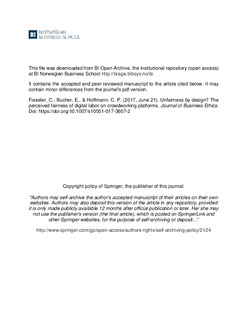| dc.contributor.author | Fieseler, Christian | |
| dc.contributor.author | Bucher, Eliane | |
| dc.contributor.author | Hoffmann, Christian Pieter | |
| dc.date.accessioned | 2018-11-09T13:19:53Z | |
| dc.date.available | 2018-11-09T13:19:53Z | |
| dc.date.created | 2017-06-27T13:55:45Z | |
| dc.date.issued | 2017 | |
| dc.identifier.citation | Journal of Business Ethics. 2017 June 21. | nb_NO |
| dc.identifier.issn | 0167-4544 | |
| dc.identifier.issn | 1573-0697 | |
| dc.identifier.uri | http://hdl.handle.net/11250/2571849 | |
| dc.description.abstract | Based on a qualitative survey among 203 US workers active on the microwork platform Amazon Mechanical Turk, we analyze potential biases embedded in the institutional setting provided by on-demand crowdworking platforms and their effect on perceived workplace fairness. We explore the triadic relationship between employers, workers, and platform providers, focusing on the power of platform providers to design settings and processes that affect workers’ fairness perceptions. Our focus is on workers’ awareness of the new institutional setting, frames applied to the mediating platform, and a differentiated analysis of distinct fairness dimensions. | nb_NO |
| dc.language.iso | eng | nb_NO |
| dc.publisher | Springer | |
| dc.title | Unfairness by Design? The Perceived Fairness of Digital Labor on Crowdworking Platforms | nb_NO |
| dc.type | Journal article | nb_NO |
| dc.type | Peer reviewed | nb_NO |
| dc.description.version | acceptedVersion | nb_NO |
| dc.source.pagenumber | 1-19 | nb_NO |
| dc.source.journal | Journal of Business Ethics | nb_NO |
| dc.identifier.doi | 10.1007/s10551-017-3607-2 | |
| dc.identifier.cristin | 1479224 | |
| dc.relation.project | Norges forskningsråd: 247725 | nb_NO |
| dc.description.localcode | 2, Forfatterversjon | nb_NO |
| cristin.unitcode | 158,9,0,0 | |
| cristin.unitname | Institutt for kommunikasjon og kultur | |
| cristin.ispublished | true | |
| cristin.fulltext | postprint | |
| cristin.qualitycode | 1 | |
